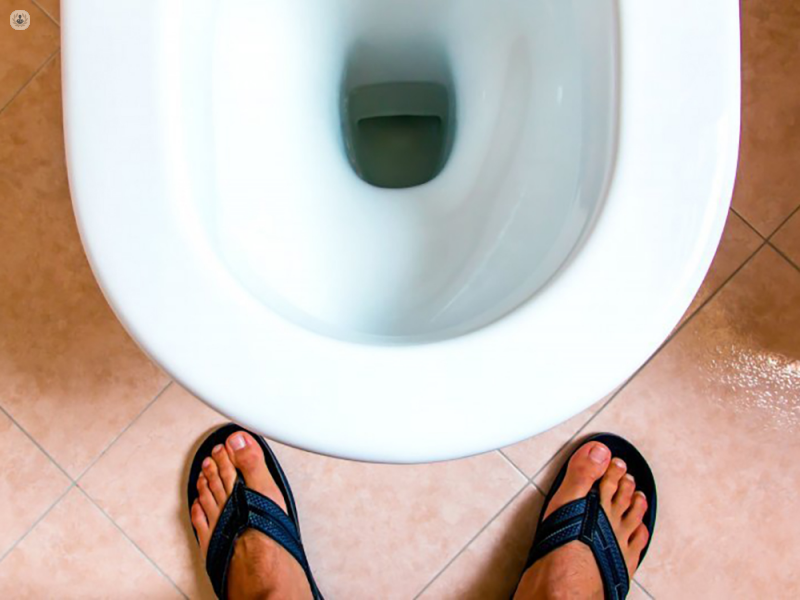What is prostatitis?
Prostatitis is an inflammation of the prostate, a gland located under the male urinary bladder that helps produce semen. It is not a common disorder of the male genitourinary system, but can be distressing and cause severe illness.

What symptoms does it present?
Symptoms vary depending on whether or not the inflammation is caused by bacterial infection. The most frequent symptoms that may suggest a diagnosis of acute prostatitis are as follows:
- Dysuria: feeling a burning pain, stinging or itching when passing urine
- Urinary frequency and urgency
- Pain in the perineum (the region between the anus and the scrotum)
- Also, bacterial prostatitis may cause fever and, if severe, uncontrollable shaking
If you have any of the symptoms above, it is important to seek medical attention immediately. Your GP or urologist will perform a digital rectal examination and may find the diagnostic sign of tenderness in the prostate. Dipping and culturing the urine will confirm the presence of pus in the urine and/or a UTI.
In cases of chronic non-bacterial prostatitis, other symptoms may occur such as:
- discomfort in the testicles, groins, base of the penis and lower central abdomen
- painful ejaculation
- erectile dysfunction
- loss of libido
Causes of prostatitis or why it occurs
In most cases, acute prostatitis is caused by a bacterial infection, typically associated with a more general urinary tract infection (UTI). You are more likely to develop acute prostatitis if:
- you suffer from recurrent UTIs (typically aged over 50)
- you are diabetic
- you have recently undergone a needle biopsy of the prostate to check for cancer
- you have a sexually transmitted infection, particularly chlamydia, or HIV (typically age below 30)
With chronic prostatitis, it is not clear what the cause is and why it comes and goes over time. Chronic prostatitis is more common among men between the ages of 30 and 50, and you are more likely to have prostatitis if it has occurred before.
Can it be prevented?
Not all types of prostatitis can be prevented. Even a single UTI in an adult male should be investigated with an ultrasound scan to look for a cause like kidney stones or incomplete bladder emptying. Good personal hygiene and practising safe sex is essential to prevent bacteria from spreading to the prostate and causing it to swell.
How is it treated?
When the cause is bacterial, prostatitis is initially treated with oral antibiotics for four to six weeks. Occasionally, a patient may need to be hospitalised and receive intravenous antibiotics. Emergency surgery is very rarely necessary to drain a prostate abscess (a walled-off collection of pus). Chronic prostatitis is more difficult to treat, although generally less severe. Anti-inflammatory painkillers, antioxidents like quercetin, prostate massage, acupuncture and even strenuous daily walking exercises may help.
How is it diagnosed?
There are numerous tests that specialists use to diagnose prostatitis. These include:
- digital rectal examination
- urine test
- blood test
- prostatic specimen test
- urodynamic tests
- imaging tests
Which specialist treats prostatitis?
Urologists are the specialists that can accurately and effectively diagnose and treat prostatitis.
11-13-2012 07-19-2023Prostatitis
What is prostatitis?
Prostatitis is an inflammation of the prostate, a gland located under the male urinary bladder that helps produce semen. It is not a common disorder of the male genitourinary system, but can be distressing and cause severe illness.

What symptoms does it present?
Symptoms vary depending on whether or not the inflammation is caused by bacterial infection. The most frequent symptoms that may suggest a diagnosis of acute prostatitis are as follows:
- Dysuria: feeling a burning pain, stinging or itching when passing urine
- Urinary frequency and urgency
- Pain in the perineum (the region between the anus and the scrotum)
- Also, bacterial prostatitis may cause fever and, if severe, uncontrollable shaking
If you have any of the symptoms above, it is important to seek medical attention immediately. Your GP or urologist will perform a digital rectal examination and may find the diagnostic sign of tenderness in the prostate. Dipping and culturing the urine will confirm the presence of pus in the urine and/or a UTI.
In cases of chronic non-bacterial prostatitis, other symptoms may occur such as:
- discomfort in the testicles, groins, base of the penis and lower central abdomen
- painful ejaculation
- erectile dysfunction
- loss of libido
Causes of prostatitis or why it occurs
In most cases, acute prostatitis is caused by a bacterial infection, typically associated with a more general urinary tract infection (UTI). You are more likely to develop acute prostatitis if:
- you suffer from recurrent UTIs (typically aged over 50)
- you are diabetic
- you have recently undergone a needle biopsy of the prostate to check for cancer
- you have a sexually transmitted infection, particularly chlamydia, or HIV (typically age below 30)
With chronic prostatitis, it is not clear what the cause is and why it comes and goes over time. Chronic prostatitis is more common among men between the ages of 30 and 50, and you are more likely to have prostatitis if it has occurred before.
Can it be prevented?
Not all types of prostatitis can be prevented. Even a single UTI in an adult male should be investigated with an ultrasound scan to look for a cause like kidney stones or incomplete bladder emptying. Good personal hygiene and practising safe sex is essential to prevent bacteria from spreading to the prostate and causing it to swell.
How is it treated?
When the cause is bacterial, prostatitis is initially treated with oral antibiotics for four to six weeks. Occasionally, a patient may need to be hospitalised and receive intravenous antibiotics. Emergency surgery is very rarely necessary to drain a prostate abscess (a walled-off collection of pus). Chronic prostatitis is more difficult to treat, although generally less severe. Anti-inflammatory painkillers, antioxidents like quercetin, prostate massage, acupuncture and even strenuous daily walking exercises may help.
How is it diagnosed?
There are numerous tests that specialists use to diagnose prostatitis. These include:
- digital rectal examination
- urine test
- blood test
- prostatic specimen test
- urodynamic tests
- imaging tests
Which specialist treats prostatitis?
Urologists are the specialists that can accurately and effectively diagnose and treat prostatitis.


What does prostate pain feel like?
By Mr Keng Jin Ng
2024-12-21
Male pelvic pain syndrome, also known as prostatitis, can affect men who are in their 20s right up to those who are middle-aged. Leading urologist Mr Keng Ng explains the symptoms and what they can feel like. See more


What is the difference between acute and chronic prostatitis?
By Mr Keng Jin Ng
2024-12-21
Both acute and chronic prostatitis (male pelvic pain syndrome) are caused by bacterial infections, which affect the prostate. Expert urologist Mr Keng Ng discusses how to treat them. See more


High PSA reading: what does it mean and does it need lowering?
By Mr Aidan Noon
2024-12-20
A PSA test determines how much PSA protein is in a man's bloodstream and can be used to assist in the diagnosis of prostate cancer and prostatitis. But how much PSA is "too much"? Mr Aidan Noon is highly specialised in reading PSA test results and he provides you with an understanding of its benefits, what results mean and if they ever need lowering. See more


Everything you need to know about prostatitis
By Mr Chris Blick
2024-12-20
Prostatitis occurs when the prostate becomes inflamed. The prostate is a small gland that is part of the male reproductive system, located just under the bladder and in front of the rectum. It produces fluid that becomes the vehicle for sperm cells to make up semen. When this gland is inflamed and swollen, it can cause discomfort and urinary issues. See more
Experts in Prostatitis
-
Mr Keng Jin Ng
UrologyExpert in:
- Laser lithotripsy
- Cystitis
- Urinary incontinence in women
- Female urology
- Prostatitis
- Prostate cancer
-
Ms Jhumur Pati
UrologyExpert in:
- Cystitis
- Prostatitis
- Circumcision
- Male infertility
- Vasectomy
- Prostatectomy (prostate removal)
-
Mr Chris Blick
UrologyExpert in:
- Aquablation
- Bladder cancer
- Benign prostate enlargement
- Prostatitis
- Urinary tract infection
- Prostate cancer
-
Mr Jacques Roux
UrologyExpert in:
- Prostate cancer
- Kidney stones
- Prostatitis
- Kidney cancer
- Bladder cancer
- Endoscopic surgery
-
Mr Ramesh Thurairaja
UrologyExpert in:
- Bladder cancer
- Prostatitis
- Prostate cancer
- Cystitis
- Testicular cancer
- Urinary incontinence
- See all

Cleveland Clinic Moorgate Outpatient Centre
Cleveland Clinic Moorgate Outpatient Centre
55 Moorgate, EC2R 6BH
No existe teléfono en el centro.
By using the telephone number provided by TOP DOCTORS, you automatically agree to let us use your phone number for statistical and commercial purposes. For further information, read our Privacy Policy
Top Doctors

The Princess Grace Hospital - part of HCA Healthcare
The Princess Grace Hospital - part of HCA Healthcare
The Princess Grace Hospital, 42-52 Nottingham Pl, W1U 5NY
No existe teléfono en el centro.
By using the telephone number provided by TOP DOCTORS, you automatically agree to let us use your phone number for statistical and commercial purposes. For further information, read our Privacy Policy
Top Doctors

The Lister Hospital - part of HCA Healthcare
The Lister Hospital - part of HCA Healthcare
Chelsea Bridge Road, London
No existe teléfono en el centro.
By using the telephone number provided by TOP DOCTORS, you automatically agree to let us use your phone number for statistical and commercial purposes. For further information, read our Privacy Policy
Top Doctors
-
Cleveland Clinic Moorgate Outpatient Centre
55 Moorgate, EC2R 6BH, Central LondonExpert in:
- Digestive
- Cardiology
- Dermatology
- Diagnostic Imaging
- Diagnostics
- Obstetrics and Gynaecology
-
The Princess Grace Hospital - part of HCA Healthcare
The Princess Grace Hospital, 42-52 Nottingham Pl, W1U 5NY, Central LondonExpert in:
- Cancer
- General Surgery
- Orthopaedic surgery
- Robotic Surgery
- Intensive care
- Sports Medicine
-
The Lister Hospital - part of HCA Healthcare
Chelsea Bridge Road, London , Central LondonExpert in:
- Cancer
- Cardiology
- Orthopaedic surgery
- Pregnancy
- Physiotherapy
- Women’s health
- See all
- Most viewed diseases, medical tests, and treatments
- Fertility preservation
- Female infertility
- Undescended testicle (Cryptorchidism)
- Testicular ultrasound
- Minimal access surgery (keyhole surgery)
- Skin biopsy
- Vaginal cytology
- NanoKnife
- Vaginal dryness
- Pelvic pain syndrome








